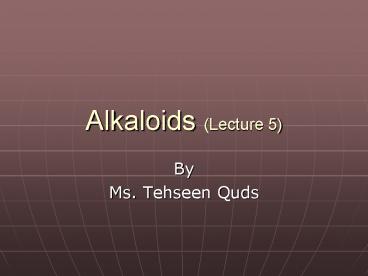Alkaloids (Lecture 5) - PowerPoint PPT Presentation
1 / 24
Title:
Alkaloids (Lecture 5)
Description:
Alkaloids (Lecture 5) By Ms. Tehseen Quds Learning Objectives At the end of this lecture students will be able to: Identify Opium and their alkaloids. – PowerPoint PPT presentation
Number of Views:145
Avg rating:3.0/5.0
Title: Alkaloids (Lecture 5)
1
Alkaloids (Lecture 5)
- By
- Ms. Tehseen Quds
2
Learning Objectives
- At the end of this lecture students will be
able to - Identify Opium and their alkaloids.
- Know the isolation of latex from Opium capsules.
- Perform extraction of Opium alkaloids.
- Explain in detail about Opium alkaloids and their
uses.
3
Opium
- Biological Source Opium or gum opium is the air
dried milky exudates obtained by incising the
unripe capsules of Papaver somniferum. - Annual herb.
- Term opium is from Greek Opion meaning Poppy
juice.
4
Opium
- History In 1806 Serturner isolated the alkaloid
morphine from Opium. The opium poppy is grown
commercially now in many countries throughout the
world. - Cultivation and Collection The cultivation of
Opium poppy is controlled internationally by the
International Narcotics Control Board of the
United Nations.
5
How to obtain Latex from Capsules?
6
Latex Collection from Capsules
- The capsules are incised with a knife, which is
usually 3- bladed and the incision is made around
the circumference of the capsule. The latex which
flows out at first is white, rapidly coagulates
and turns brown to blackish. - Each capsules incised 4 or 5 separate times.
7
Latex Collection from Capsules (Continued)
- The congealed opium is scraped off with an iron
scoop or knife before the heat makes it more
tightly. - When sufficient latex is collected, it is kneaded
into bails that are wrapped in poppy leaves and
dried in the shade.
8
Constituents
- More than 30 different alkaloids have been
obtained. Most important of these are Morphine
(4-21), Codeine (0.8-2.5), Noscapine formerly
narcotine (4-8), Papaverine (0.5-2.5), thebaine
(0.5-2) and narceine etc. - Externally, opium is pale olive brown or olive
gray.
9
Extraction from Opium
Precipitate (Narcotine, Papaverine, Thebaine)
Filtrate (Morphine, Codeine, Narceine)
10
Extraction from Opium (Continued)
Filtrate extracted With Chloroform
1. Dissolve ppt. in alcohol 2. Acidify with
Acetic acid 3. Add 3 volumes of boiling water
Chloroform
Aqueous sol. Morphine, Narceine
Precipitate (narcotine)
Aqueous Solution (Thebaine)
Acidify then make slightly Alkaline with Ammonia
Dissolve in boiling 0.3 oxalic acid sol and
cool
Precipitate (Morphine)
Aqueous sol. (Narceine)
Aq.sol. Narcotine oxalate
Crystals (Papaverine Oxalate)
11
Opium Uses
- Pharmaceutic necessity for powdered opium.
- As an analgesic, a hypnotic, narcotic and
antidiarrheal. - Checks excessive peristalsis.
- Dose 60 mg
- Prescription products Dovers powder and
camphorated opium tincture.
12
Opium uses (Continued)
- Paregoric or Camphorated opium tincture is
classed as an antiperistaltic. - Usual dose is 5-10ml 1-4 times a day.
13
Poppy seeds
- Poppy seed or Maw seed is the dried seed of
Papaver somniferum. - Poppy seeds contain no significant quantity of
alkaloids contains 50 fixed oil. - Seed used as food and salad dressing.
14
Opium Alkaloids Morphine
- Morphine and its salts are classed as narcotic
analgesic. - Strongly hypnotic and narcotic.
- Induces nausea, vomiting, constipation and habit
formation. - Dose Morphine Sulfate parentrally is 10mg 6
times a day.
15
Codeine
- Most widely used opium alkaloid. It may be either
obtained from opium (0.2 to 0.7). - Prepared from morphine by methylation.
- From thebaine by demethylation.
16
Codeine Uses
- Narcotic analgesic and antitussives.
- As sedative especially in allaying coughs.
- It is considerably less toxic and involves much
less danger of habit formation. - Dose
- Usual doses of codeine phosphate and Codeine
sulfate are - As analgesic 15-60 mg every 4 hrs.
- As antitussive10-20 mg every 4-6 hrs.
17
Heroine
- Diacetyle morphine or heroine is formed by the
acetylation of morphine. - Danger of habit formation its manufacture in the
United States is forbidden by law and its use in
medicine has been discontinued.
18
Apomorphine HCl
- Preparation
- When Rejected?
- Used as an emetic and is particularly valuable in
cases of poisoning because it may be administered
SC. - Dose SC is 100µg/Kg of body weight. (Max 6mg)
19
Papaverine
- Occurs naturally in opium to the extent of about
1. - Used as Smooth muscle relaxant and an antitussive
in combination with Codeine sulfate. - Dose Orally 150 mg, IM 30 mg.
- As antitussive 15mg.
- Products Pavabid, Pavadyl, Copavin (Comb.)
20
Hydromorphone HCl
- Morphine derivative
- Use powerful narcotic analgesic.
- Dose 2 mg every 4 hrs
- Product Chief ingredient in Dilaudid cough
syrup. - Side effects
21
Hydrocodone bitartarate or Dihydrocodeinone
bitartarate
- Codeine derivative
- Use As an antitussive
- Dose 5-10mg, 3 to 4 times a day.
- e.g. Dicodid and Codone
22
Noscapine
- Commonly called Narcotine and Anarcotine.
- Antitussive.
- Dose 15mg up to 4 times a day.
- Available in syrup and chewable tablets. e.g.
Conar and Theo-Nar.
23
Opioid Analgesics
- What Opioid term indicates?
24
References
- Pharmacognosy by Varro E Tyler, 10th Edition,pp.
195-261 - Trease and Evans, Pharmacognosy, 16th Edition pp.
353-415. - Pharmacognosy by CK Kokate, 39th Edition,
Pp.460-530 - www.google.com































